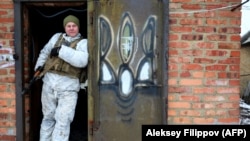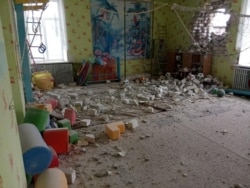On February 15, Russian President Vladimir Putin accused Ukraine of “genocide” in eastern Ukraine.
“In our view what is now happening in Donbas is genocide,” Putin said at a news conference with German Chancellor Olaf Scholz, who was in Moscow to urge Russia to withdraw troops massed along Ukraine’s borders with Russia, Belarus and Moldova.
The claim is misleading.
In the past, Putin and other Russian leaders have loosely used the term genocide against their opponents, not only in Ukraine, but Georgia as well during the 2008 war there. In the case of Ukraine, one common trope is to allege persecution of "Russian-speakers" by claiming laws ban the use of the Russian language in public. They do not, in fact.
More recently, Putin repeatedly complained about a law recognizing the indigenous people of Ukraine. He claimed the law excluded Russians as indigenous people and compared Ukraine to Nazi Germany. What he neglected to mention was that the law also excludes Ukrainians and only applies to select groups within a United Nations definition.
There has never been evidence that Ukrainian authorities committed "genocide" or carried out the forced extermination of any group since Russia instigated war in Ukraine in the spring of 2014.
Ethnic Russians live peacefully throughout Ukraine, some of them even serving in the country’s armed forces. The Russian language is still widely used on a daily basis, contradicting Russian claims that “Russian-speakers” are persecuted. Rather, some pro-Russia authorities in the so-called Donetsk and Luhansk “People’s Republics” have removed the Ukrainian language from public life and education.
The war in Donbas has claimed the lives of some 14,000 Ukrainians, mostly civilians. Russia has fed the war by providing pro-Russian forces with commanders, ammunition, fuel and other military supplies.
The United Nations defines genocide as:
“[A]any of the following acts committed with intent to destroy, in whole or in part, a national, ethnical, racial or religious group, as such:
Killing members of the group;
Causing serious bodily or mental harm to members of the group;
Deliberately inflicting on the group conditions of life calculated to bring about its physical destruction in whole or in part;
Imposing measures intended to prevent births within the group;
Forcibly transferring children of the group to another group.”
Perhaps the closest incident was in 2014 by Russian occupation forces in Slovyansk, where Ukrainian forces who retook the city found a mass grave containing 20 bodies. Those killed included a Protestant minister and several members of a local congregation. Protestants have been persecuted in pro-Russian territory, where Protestant congregations are banned.
Since 2014, the Organization for Security and Cooperation in Europe (OSCE) has maintained its special monitoring mission (SMM) in Donbas to watch both sides in the conflict. While Russian-led forces have often restricted the mission’s movement in territory under their control, the OSCE has never found any evidence of “genocide.” The OSCE mission has had full access to the Ukrainian government-controlled territory, and no genocide has been reported there.
The U.S. has condemned Russia’s false claims of “genocide,” characterizing them as rationalizations for possible further armed incursion against Ukraine.
“This is a false narrative that Russia is developing to use as a pretext for military action against Ukraine,” U.S. State Department spokesman Ned Price said of the “genocide” charge on February 17.
On February 17, OSCE monitors reported a massive uptick of shelling by pro-Russian forces in Donbas. A shell struck a kindergarten while the children were eating breakfast. Fortunately, none was harmed, although one teacher suffered a minor concussion from the detonation.
The pro-Russian side blamed the ceasefire violations on the Ukrainian side, but so far evidence has only come from the latter. The OSCE reported about 500 ceasefire violations, including 300 explosions, on February 17, from Donetsk and Luhansk combined.
On February 18, pro-Russian authorities in the two provinces announced the evacuation of civilians to Russia, and videos appeared showing buses lining up to carry passengers. One social media video purportedly showed civilians driving toward Russia in private cars.
The Kremlin has a history of abusing the term “genocide,” journalist Matthew Kupfer and scholar Thomas de Waal wrote in 2014 for the Carnegie Endowment for International Peace.
“In Russian discourse, the idea of a ‘genocide’ perpetrated by Ukrainians against ethnic Russians proliferated in opposition to the 2004 Orange Revolution. In that year, a Russian language website published an article entitled ‘The First Signs of the Russian Ethnocide,’ referring to a draft law that would have required all civil servants to use the Ukrainian language. The bill in question was rejected in the Ukrainian parliament, but the author believed it could still be passed in the future. If that happened, she predicted, Russian speakers would be excluded from the government, have their media eliminated, be unable to defend themselves in court, and even face assault and murder …
“The Donetsk separatist leader Denis Pushilin referred to clashes in Odessa on May 2, 2014, when over 40 people lost their lives during a fire, as the ‘genocide in Odessa.’ On May 13, another rebel leader, Miroslav Rudenko, said the separatists would like a ‘civilized divorce’ with Ukraine, but that the ‘efforts of the junta’ were complicating the process. ‘Now there are occupation forces on the territory of the republic that carry out terrorist acts and genocide against the civilian population,’ he explained. In Russia, Sergei Naryshkin, the speaker of the country’s parliament, called the actions of the Kiev government a ‘real genocide of both the Russian and Ukrainian nations.’”






